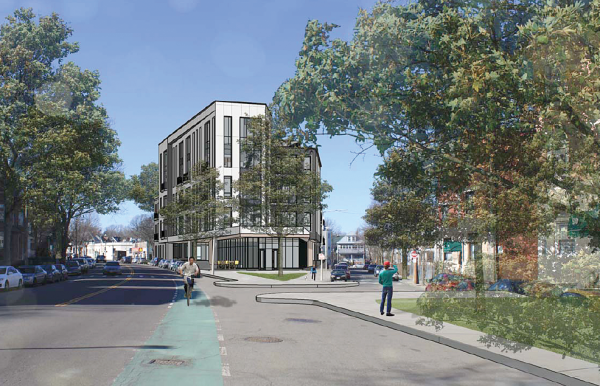January 25, 2024

A rendering shows the property at 500 Talbot Avenue as contemplated by the team at JMB Property Development Company. The four-story mixed-use building will house 42 rental units and a second location of the Daily Market grocery store. Image courtesy RODE Architects
The former Our Saviour’s Lutheran church space at 500 Talbot Avenue near the intersection with Welles Avenue is making way for a four-story mixed-use development with 42 rental units, 23 underground parking slots, and retail space that will house a second location of the Daily Market grocery store that is expected to be ready for occupancy this fall.
The project is being led by JMB Property Development Company, which is owned by Dorchester’s James Baker. It is heavily financed, with $19.7 million of the cost coming from MassHousing, a quasi-state agency that provides backing for affordable housing in the state.
Additional financing sources include $16.5 million in construction from Enterprise Bank, $5.6 million from the Massachusetts Housing Investment Corporation’s Health Neighborhoods Equity Fund, and $1.4 million in developer financing.
“Dorchester is getting kind of a facelift,” said Douglas O’Brien, an underwriter at MassHousing. “The developers [Baker and business partner John McDonough] came to us and said they want to bring in a deal that has some market rate units but also what we call workforce housing units.”
Of the 42 apartments, 17 are labeled workforce housing units affordable to moderate-income households. “Forty percent of the project is in the workforce category, so it’s a really nice balance and a good sort of commitment to the whole affordable aspect for the people that might qualify for that area,” said McDonough.
Five of the workforce housing units will be restricted to households earning up to 70 percent of the Area Median Income, four will be limited to households earning up to 80 percent of AMI, and eight be regulated to households earning up to 100 percent of AMI.
“The workforce housing units are really for the young adults right out of college who have their first job and can’t pay for a mortgage or high rent prices in Boston,” O’Brien said. “There’s a lot of market rate in this neighborhood. We want to bring in some affordability where we can give those young adults or municipality workers a great place to live in the area where they work at affordable rent levels.”
The remaining 25 apartments will have rents that are not restricted. Overall, the building will offer 26 one-bedroom apartments, 12 two-bedroom apartments, and 4 three-bedroom apartments.
Thomas Farmer of MassHousing noted that demand is high for this mix of units.
“Usually when a new development like this is built there are hundreds of people who apply for the affordable units and there›s such a huge demand for it,” said Farmer. “To be able to put a brand-new apartment building that’s near public transportation that working folks will be able to afford is a big thing for the neighborhood.”
What makes the building transit-oriented is its proximity to the Ashmont/Peabody Square Red Line T Station (5-minute walk) and, a bit farther north, the Shawmut T Station (10 minutes). The building will also offer underground parking for bicycles and will have electric vehicle chargers.
The Daily Market currently has a venue in another Baker-owned building on Savin Hill Avenue. “I like to refer to it as a small format urban grocery store,” Baker said. “You can do a full grocery shop in our store that’s a little over 3,500 square feet.”
Added McDonough: The store will offer not only groceries but also a space for the community to connect. “If you were to come visit the Daily in Savin Hill, it is a place that has really become a community center. People are in and out multiple times a day. … When we look at the 500 Talbot project, in that community they don’t have anything like this. The community is extremely excited about the idea of having a real market in the area that people can go to by foot and see their neighbors.”
McDonough and Baker are working to improve the landscape as well. “We’ve committed to improving the front of the building in the public domain, improving the traffic patterns, pedestrian safety, the walkability of it and creating a little parklet,” Baker said in an interview with the Reporter. “So not only are we kind of providing the affordable units and the market, we are also going to be making some improvements to the infrastructure.”
Pre-leasing for units is expected to start in early spring. “The whole building should be operational and at least 90 percent occupied at the earliest end of this year, most likely the first quarter of 2025,” O’Brien said.
The building as a work in progress has already begun to positively impact the community of Dorchester, said MassHousing’s Farmer.
“It’s helping provide people with jobs, the construction workers and related services,” he said, “and then it will help provide people with permanent stable housing that they can afford, and they can use as a springboard for their careers and maybe down the road they will be in the position to buy a house.”
Added O’Brien the underwriter: “It’s a massive positive impact for the direct neighborhood and Dorchester as a whole. Any new kind of building with commercial space and full amenities for the residents is a massive draw for people looking for housing.”


